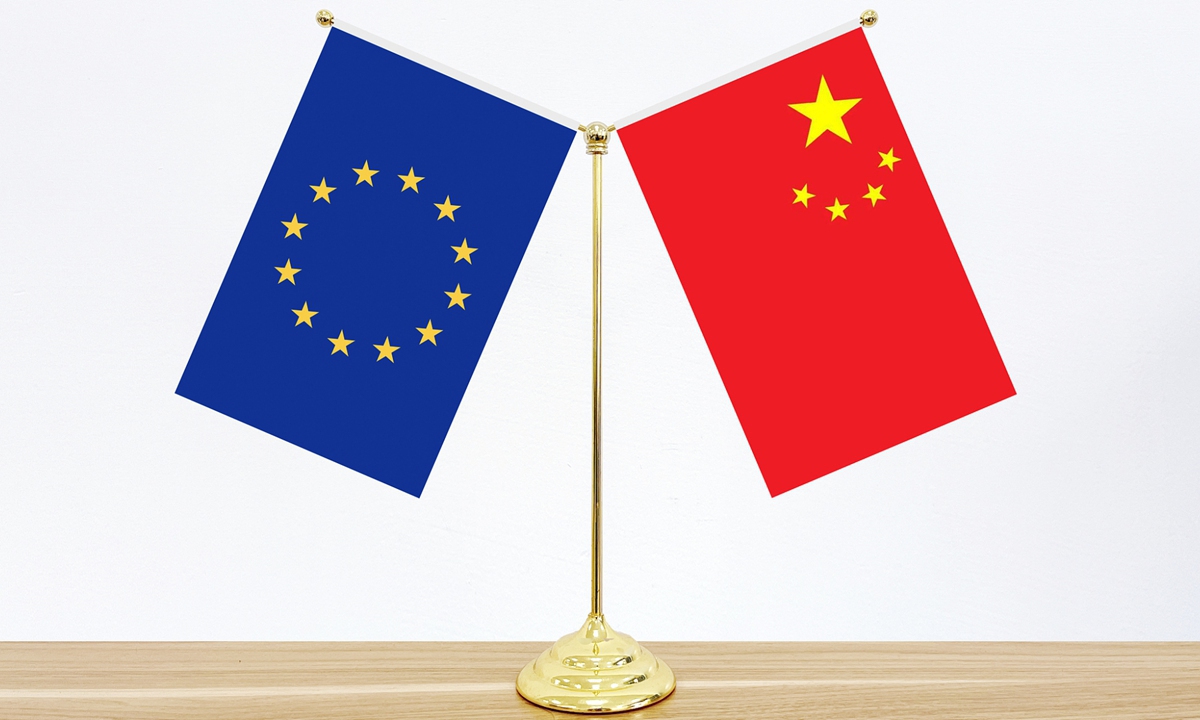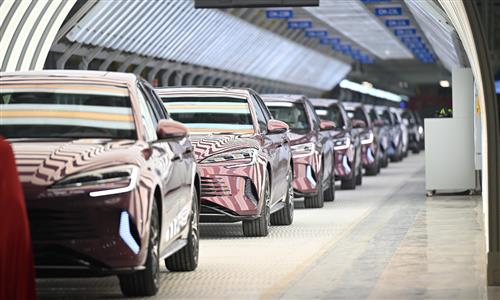China's anti-dumping probe into EU brandy doesn't target any member: commerce minister

China EU Photo:VCG
Chinese Commerce Minister Wang Wentao said on Monday in France that China's anti-dumping investigation into brandy imported from the EU does not target any specific EU countries nor carry predefined findings, as China and the EU have strengthened communication recently to clear the clouds hanging over bilateral economic and trade cooperation.
Analysts said that China's anti-dumping probe into the brandy imports is fundamentally different from the EU's politically motivated anti-subsidy investigations into Chinese electric vehicles (EVs).
They urged the EU to increase its strategic independence and join hands with China to appropriately deal with disagreements through dialogue for the benefit of both sides as well as global economic growth.
The anti-dumping investigation was prompted by a complaint submitted by China's brandy industry, Wang said when meeting with three French brandy trade associations and five French brandy producers in Paris, according to a statement on the Ministry of Commerce (MOFCOM) website.
China will conduct the investigation openly and transparently in accordance with Chinese law and WTO rules, while fully safeguarding the rights of all stakeholders, the minister said.
Wang's remarks came as Western media outlets hyped the Chinese move as a tit-for-tat countermeasure to the EU's anti-subsidy investigations into Chinese EVs.
"The EU's protectionist move is purely a political decision by the European Commission, which is groundless and violates WTO rules," Zhang Jian, vice president of the China Institutes of Contemporary International Relations, told the Global Times on Tuesday.
Zhang blasted some European politicians - under pressure from the US - who advocate "de-risking" against China, resulting in serious disruptions to normal China-EU economic and trade cooperation.
Amid the global trade slowdown and other factors, China-EU trade in goods slipped 7.1 percent year-on-year to reach $783 billion in 2023, according to data released by China's General Administration of Customs.
However, recent frequent exchanges between senior Chinese and European officials have sent a positive signal of deepening China-EU economic and trade development, Yang Chengyu, an associate research fellow at the Institute of European Studies of the Chinese Academy of Social Sciences, told the Global Times on Tuesday.
According to Western media reports, German Chancellor Olaf Scholz will visit China in mid-April with a business delegation. Some leading German companies confirmed to the Global Times the participation of their CEOs in the delegation.
As economic and trade relations remain a ballast stone for China-EU relations, deepening pragmatic cooperation in more sectors conforms to both sides' interests, according to Yang.
"The EU is pursuing a green and digital transition, while China has notable production capacity advantages in these areas. Thus, increased economic and trade cooperation will contribute to the bloc's development and prosperity," Yang said, noting that "de-risking" will risk losing opportunities from the huge China market.
Wang met members of the French business community including Airbus CEO Guillaume Faury and BNP Paribas Chairman Jean Lemierre. During the meetings, the French companies said that they are firmly positive about China's economic prospects and business environment, with commitments to long-term development in the market, according to a separate statement on the Chinese Commerce Ministry's website.
Along with China's high-level opening-up, European companies have rapidly increased investment in the market for greater opportunities. Volkswagen has established its largest overseas research and development (R&D) center in North China's Tianjin.
Valeo has announced plans to build a comfort and driving assistance systems manufacturing and R&D site in Shanghai. AstraZeneca will invest $475 million to build a small molecule drug factory in Wuxi, East China's Jiangsu Province.
During Wang's meetings with French officials and business executives in Paris, he stressed that China is promoting high-quality development and accelerating the development of new quality productive forces so as to create a fair competition environment for domestic and foreign enterprises, providing wider opportunities for European companies, including those from France.
China is willing to join hands with France to give play to existing economic and trade mechanisms to appropriately control disagreements through dialogue and cooperation and strengthen efforts to address each other's reasonable key concerns, Wang said.
It's normal that China and the EU have disagreements, experts said. With understanding and consensus, the two sides will be able to appropriately deal with these disagreements and boost China-EU economic and trade cooperation to a direction that benefits both sides, Zhang said, expressing optimism for the prospects of bilateral trade cooperation.

